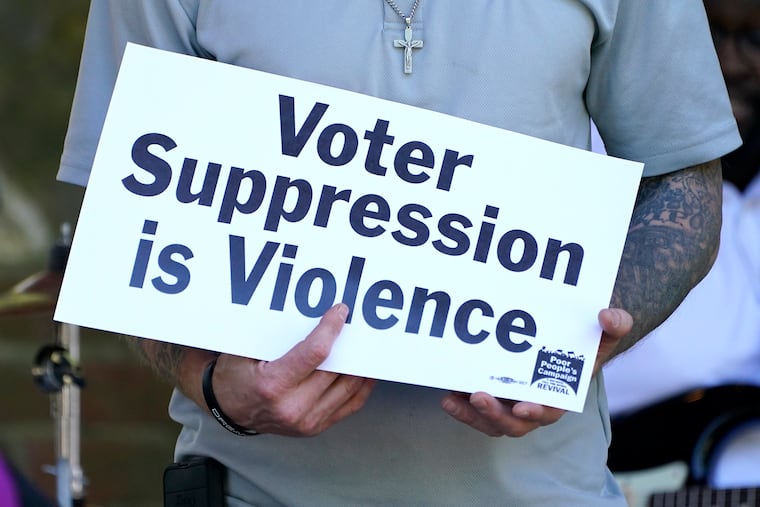I’m voting for the first time ever. A felony conviction unfairly kept me from casting a ballot for 20 years.
Around 19 million Americans have a felony record, many of whom are disenfranchised. But there’s an ongoing debate about the fairness and impact of these laws.

On Nov. 5, when millions in this country stand in line at churches and schools and community centers to choose our next president, I — now aged 40-plus — will be voting for the first time. Ever.
That autumn day, I’ll walk into a polling station, cast a ballot, and enjoy the honor of choosing the best leader for this nation, while exercising my constitutional right as a free American.
The reason I’ve never voted before is that I was charged with a felony property crime when I was 21 years old — more than two decades ago. In a moment of drunken stupidity, my friends and I stole beer from a neighbor’s fridge while they were on vacation. I was found guilty of burglary, thus labeling me a felon, and beginning a long journey with the criminal justice system.
Around 19 million Americans have a felony record. Some never go to prison, some are serving life sentences, but almost all of us became disenfranchised the moment the judge dropped the gavel — disqualified from participating in one of the most important duties a citizen can perform for their country.
Not being able to vote prevents me from choosing my elected officials, but it also exiles me from a group of people who believe in voting as a way to do something for their community. Having my rights taken made me an outlier in many ways, but now I will finally be able to join them.
In our country, one out of every 59 adults — 1.7% of the total U.S. voting-eligible population — is still disenfranchised because of a felony conviction.
In Maine, Vermont, and Washington, D.C., residents do not lose the right to vote even while incarcerated.
» READ MORE: Should prison inmates be allowed to vote? | Pro/Con
Twenty-three states, including Pennsylvania, restore voting rights upon release from prison, while 15 states make you wait until probation or parole is completed.
Most disturbingly, Florida and eight other states can — and do — take a person’s right to vote away permanently. In Florida, for example, if your felony conviction is for “murder or a sexual offense,” you are permanently ineligible to vote unless that right is restored by the state clemency board.
According to a recent report by the Sentencing Project, an advocacy group for criminal justice reform, 41,282 people who are currently incarcerated for a felony offense in Pennsylvania are not allowed to vote. The majority of those affected are people of color from Philadelphia; they will have their rights automatically restored at the end of sentence.
The rationale behind this restriction is that those who have committed crimes may not have the moral integrity required to participate in the democratic process. Additionally, some argue that voting is a privilege that should be reserved for law-abiding citizens.
But there’s an ongoing debate about the fairness and impact of these laws, with advocates like the American Civil Liberties Union pushing for reforms to restore voting rights to those affected, indicating a growing awareness and push for a sweeping overhaul in this area. Furthermore, incarcerated Americans are counted in the U.S. Census and represented in Congress, which should be grounds for having the right to choose your representatives and vote with your community.
Twenty-three states, including Pennsylvania, restore voting rights upon release from prison.
Former President Barack Obama once said, “I believe that everybody who has served their time and paid their debt to society should be able to vote.” But while his statement echoes the feelings of many Americans today, no president has ever promoted a constitutional amendment making voting an inalienable right. And while the Voting Rights Act of 1965 eliminated barriers to voting, especially for people of color, its protections did not extend to those who have broken the law.
» READ MORE: Voting for first time, @Wallo267 has some advice for fellow returning citizens and politicians | Helen Ubiñas
Because of poor choices I made to support my addiction to pain pills, I have been incarcerated more than once over the years, but I was held accountable and took responsibility for my actions. I am not a victim.
But losing my right to vote, and the ancillary punishments that came from having a felony record, seemed unreasonable, arbitrary, and unconstitutional.
When I had my voting rights restored last year through the efforts of a friend, Desmond Meade, founder of the Florida Rights Restoration Coalition and a MacArthur Fellowship “Genius Grant” winner, it felt like a million pounds was taken off my shoulders.
Now, in just a few weeks, I will vote in a presidential election for the first time in my life, but it’s not lost on me that four million Americans are still unable to vote in the upcoming 2024 election because of felony disenfranchisement.
Ryan M. Moser is a formerly incarcerated journalist, award-winning writer, podcaster, and communications consultant.